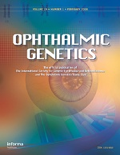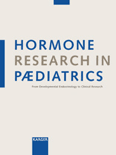
CLINICAL DYSMORPHOLOGY
Scope & Guideline
Pioneering insights into pediatric health and dysmorphology.
Introduction
Aims and Scopes
- Clinical Characterization of Dysmorphic Syndromes:
The journal emphasizes the detailed clinical characterization of various dysmorphic syndromes, including their phenotypes, associated anomalies, and long-term outcomes. - Genetic Studies and Variant Identification:
A significant focus is on identifying novel and recurrent genetic variants associated with dysmorphic syndromes, aiding in diagnosis and understanding of genotype-phenotype correlations. - Case Reports and Literature Reviews:
The journal frequently publishes case reports that document unique presentations and the associated literature, contributing to the collective knowledge of rare conditions. - Interdisciplinary Approaches to Diagnosis:
It includes studies that explore interdisciplinary approaches to diagnosing and managing dysmorphic conditions, integrating genetic, clinical, and radiological data. - Longitudinal Studies and Follow-ups:
Research articles often include long-term follow-ups of patients, providing insights into the natural history of dysmorphic syndromes and their progression over time.
Trending and Emerging
- Novel Genetic Variants and Their Implications:
Recent publications have increasingly focused on identifying novel genetic variants and their clinical implications, reflecting a shift towards more personalized medicine in dysmorphology. - Expansion of Phenotypic Spectrum:
There is a growing trend in expanding the known phenotypic spectrum of various syndromes, indicating a deeper understanding of the variability and complexity of genetic conditions. - Integration of Advanced Genomic Techniques:
The use of advanced genomic techniques such as whole-exome sequencing and chromosomal microarrays is becoming more prevalent, allowing for more precise diagnoses and insights into rare genetic disorders. - Interdisciplinary Case Studies:
Emerging themes include interdisciplinary case studies that combine genetics, clinical observations, and imaging techniques to provide comprehensive insights into complex cases. - Focus on Ethnic and Geographic Variability:
There is an increasing interest in studying the ethnic and geographic variability in the presentation of dysmorphic syndromes, which aids in understanding the global diversity of these conditions.
Declining or Waning
- General Genetic Counseling:
There has been a noticeable decrease in publications that focus solely on genetic counseling aspects of dysmorphic syndromes, likely due to the increasing integration of genetic information into clinical practice. - Broad Phenotypic Descriptions without Genetic Correlation:
Papers that provide general descriptions of dysmorphic features without correlating them to specific genetic findings have become less frequent, as there is a stronger emphasis on genetic underpinnings. - Focus on Common Syndromes:
Research on more common dysmorphic conditions, which previously had a significant presence, is declining as the journal shifts towards highlighting rare and novel syndromic presentations. - Historical Literature Reviews:
The trend of publishing extensive historical literature reviews on well-established syndromes has diminished, with a preference for novel findings and case studies. - Single-Country Studies:
There is a reduced emphasis on studies limited to single-country cohorts, as the journal increasingly values diverse, multi-national research to enhance generalizability.
Similar Journals

Fetal and Pediatric Pathology
Connecting research and practice for healthier futures.Fetal and Pediatric Pathology, an esteemed journal published by TAYLOR & FRANCIS INC, is dedicated to advancing the field of pediatric and fetal medicine through the dissemination of high-quality research and clinical insights. With an ISSN of 1551-3815 and an E-ISSN of 1551-3823, the journal has been a key resource for researchers and practitioners since its inception in 1983. Based in the United Kingdom, it covers a broad spectrum of topics relevant to Medicine, Pathology and Forensic Medicine, and Pediatrics, Perinatology, and Child Health, consistently reflecting on contemporary challenges faced in these fields. The journal has attained a commendable Q3 ranking within its categories as of 2023, underlining its relevance in the academic community. Though not an open-access publication, the research presented in Fetal and Pediatric Pathology plays a pivotal role in informing practice, guiding future studies, and enhancing the understanding of diseases affecting fetuses and children. Its convergence of research throughout multiple years, continuing until 2024, marks it as a crucial platform for ongoing scientific dialogue and innovation, aimed at fostering better health outcomes for younger populations.

Case Reports in Perinatal Medicine
Elevating standards in maternal and neonatal health.Case Reports in Perinatal Medicine is a premier academic journal dedicated to the dissemination of knowledge and research in the specialized field of perinatal medicine. Published by WALTER DE GRUYTER GMBH, this journal serves as a critical resource for healthcare professionals, researchers, and students focused on the complexities of perinatal care, maternal health, and neonatal outcomes. The journal aims to foster the exchange of innovative case reports and clinical insights that advance the understanding of perinatal conditions, ultimately contributing to improved patient care and outcomes. While it offers a robust platform for research dissemination, Case Reports in Perinatal Medicine is characterized by its rigorous peer-review process, ensuring high-quality submissions. Subscribe to enhance your expertise in this vital area of medical science and to stay abreast of the latest developments in perinatal research.

European Journal of Medical Genetics
Advancing Genetic Insights for Enhanced HealthcareEuropean Journal of Medical Genetics, published by Elsevier, is a pivotal platform dedicated to advancing knowledge in the fields of medical genetics and its clinical applications. With an ISSN of 1769-7212 and an E-ISSN of 1878-0849, this journal fosters innovative research and insights into the genetic factors that influence human health. Ranked in the Q3 category for both Genetics and Clinical Genetics, and achieving notable recognition in Medicine (miscellaneous) with a Q2 positioning, it strives to bridge the gap between laboratory findings and clinical practice. Operating in an Open Access format, the journal aims at maximally disseminating essential findings to researchers, professionals, and students alike, ensuring that critical advances in genetics are accessible to the global medical community. With converged publication years spanning from 2005 to 2024, the journal strengthens its mission to be at the forefront of genetic research that informs clinical methodologies and fosters improved healthcare outcomes.

Application of Clinical Genetics
Pioneering Discoveries in Personalized MedicineApplication of Clinical Genetics is a premier open-access journal published by Dove Medical Press Ltd., dedicated to advancing the field of clinical genetics since its inception in 2008. Based in New Zealand, this journal has established itself as a significant resource for researchers, clinicians, and students alike, contributing to the body of knowledge in both genetic medicine and clinical applications. With an impact factor reflecting its contributions to the field, the journal holds positions in the Q2 and Q3 quartiles of the 2023 Genetics categories, showcasing its relevance and scientific merit. Furthermore, it ranks #43 out of 99 in Clinical Genetics and #153 out of 347 in Biochemistry, Genetics, and Molecular Biology, indicating robust performance amongst its peers. The journal’s broad scope, encompassing various aspects of clinical genetics, ensures that it remains at the forefront of critical discussions, innovative research, and applications essential for the progression of personalized medicine. Researchers and professionals are encouraged to explore its openly accessible content that fosters collaboration and the sharing of knowledge in this dynamic and rapidly evolving field.

OPHTHALMIC GENETICS
Connecting Genetic Insights to Clinical Eye CareOPHTHALMIC GENETICS is a distinguished journal published by TAYLOR & FRANCIS INC, specializing in the intersection of genetics and ophthalmology. Established in 1981, the journal has become a vital resource for researchers, clinicians, and students interested in the genetic aspects of eye diseases and disorders. Despite not being an Open Access journal, it maintains a commendable impact within the academic community, as reflected by its Q3 ranking in clinical genetics and Q2 rankings in both ophthalmology and pediatrics in 2023. With a robust focus on clinical applications, OPHTHALMIC GENETICS aims to provide a platform for innovative research and insights that drive advancements in patient care and understanding of genetic conditions affecting vision. The journal's international readership is supported by its timely publication of articles that bridge the gap between genetic research and practical ophthalmological applications.

Hormone Research in Paediatrics
Illuminating the path in pediatric endocrinology.Hormone Research in Paediatrics, published by KARGER, is a leading international journal dedicated to advancing the field of pediatric endocrinology. With its ISSN 1663-2818 and E-ISSN 1663-2826, it serves as a vital resource for researchers and professionals focused on the hormonal aspects affecting children's health. Housed in Switzerland, the journal benefits from a strong academic reputation and ranks in the prestigious Q1 category in Pediatrics, Perinatology, and Child Health, as well as maintaining Q2 status in Endocrinology, Diabetes, and Metabolism. Covering a time span from its inception in 1970 to the present day, Hormone Research in Paediatrics is committed to publishing high-quality original research, reviews, and clinical studies, making crucial contributions to our understanding of pediatric hormonal disorders and treatments. The journal incorporates open access options, fostering wider dissemination and accessibility of vital research findings, thus ensuring that significant advancements reach academics, professionals, and students globally.

Molecular Genetics & Genomic Medicine
Empowering the future of genomic medicine.Molecular Genetics & Genomic Medicine, published by WILEY, is an esteemed and open-access journal that has been a prominent source of knowledge in the fields of genetics and molecular biology since its establishment in 2013. With an ISSN of 2324-9269, it aims to provide a platform for the dissemination of novel findings and innovative research that pushes the boundaries of genomics and its clinical applications. The journal holds a Q3 categorization in Genetics, Clinical Genetics, and Molecular Biology, reflecting its growing influence in these disciplines, as evidenced by its Scopus rankings. Researchers, professionals, and students alike will find valuable insights and advancements in genomic medicine, making this journal an essential resource for those dedicated to the understanding and application of genetic and molecular research in healthcare. Located at 111 River St, Hoboken, NJ, Molecular Genetics & Genomic Medicine continues to foster a global dialogue within the scientific community, ensuring accessible knowledge for all.

Human Genome Variation
Pioneering Insights into Genome DiversityHuman Genome Variation, published by SpringerNature, is an esteemed open access journal dedicated to the field of genetic research and exploration. Since its inception in 2014, the journal has been at the forefront of advancing our understanding of human genome diversity and its implications in health and disease. With an E-ISSN of 2054-345X, it features a diverse array of studies that encompass biochemistry, genetics, and molecular biology, making it an invaluable resource for researchers and professionals alike. The journal holds a Q3 ranking in both biochemistry and genetics, and a Q4 ranking in molecular biology, highlighting its growing influence within these disciplines. As the landscape of genomics continues to evolve, Human Genome Variation serves as a platform for the dissemination of high-quality research, fostering collaboration and innovation within the scientific community. Researchers and academics are invited to contribute to this pivotal journal, which not only provides open access to its content since 2014 but also aims to bridge the gap between basic research and clinical applications in genetics.

Journal of Fetal Medicine
Transforming knowledge into better outcomes for mothers and infants.Welcome to the Journal of Fetal Medicine, a leading publication dedicated to the progress of research in the field of fetal health and medicine. Published by Thieme Medical and Scientific Publishers Pvt Ltd, this journal serves as a vital resource for professionals, researchers, and students alike, offering insights into the latest advancements, methodologies, and best practices in fetal medicine. With ISSN 2348-1153 and E-ISSN 2348-8859, the journal aims to provide an international platform for sharing valuable findings and clinical practices to improve outcomes for both mothers and their unborn children. While the journal is not open access, it ensures the dissemination of high-quality peer-reviewed content, promoting knowledge exchange across various subspecialties within fetal medicine. The Journal of Fetal Medicine is poised to impact the field significantly, fostering innovation and collaboration among its readership.

Molecular Cytogenetics
Pioneering Studies in Molecular Cytogenetics for Global Impact.Molecular Cytogenetics is a prestigious open-access journal published by BMC, dedicated to advancing the fields of biochemistry, genetics, and molecular biology. Since its inception in 2008, this journal has facilitated prominent research and developments in the cytogenetics domain, featuring innovative studies and reviews that explore the intricate relationship between cellular structures, genetic makeup, and various biological processes. With a robust impact factor and a commendable positioning within Q3 and Q4 categories across multiple relevant disciplines, it provides a vital platform for researchers to disseminate their findings to a global audience. The journal's open-access model ensures that cutting-edge research is readily available to students, professionals, and scholars, promoting free knowledge exchange. Situated in the vibrant landscape of the United Kingdom, Molecular Cytogenetics continues to contribute significantly to scientific progress, solidifying its role as an essential resource for those engaged in the exploration of genetic and cytogenetic inquiry.